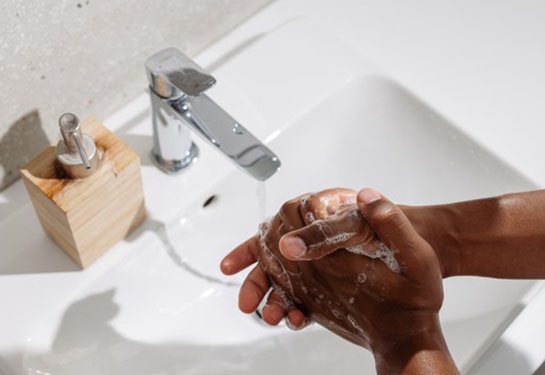HSV (Herpes Simplex Virus)
Our team provides expert diagnosis and treatment of HSV. You receive a customized plan to minimize outbreaks, reduce the spread of the virus and feel your best physically and mentally.
Medically reviewed by Dean Blumberg, M.D. on Aug. 25, 2023.

What Is Herpes Simplex Virus?
Herpes simplex virus (HSV), or herpes, is a contagious virus that spreads through saliva, skin-to-skin contact and active sores. Most people in the world have the herpes virus in their bodies even if they don’t have symptoms.
Herpes includes two types:
- HSV-1, which usually spreads through saliva or kissing and causes cold sores (oral herpes)
- HSV-2, which usually spreads through sexual contact and causes most cases of genital herpes, a sexually transmitted infection (STI)
Symptoms of HSV
HSV doesn’t always cause symptoms, so many people don’t know they have it. But it’s important to know the symptoms so you can avoid spreading it to others.
Common Symptoms
Symptoms of HSV-1 and HSV-2 occur during HSV “outbreaks,” which come and go. When you’re not having an outbreak, you may not have any signs of the virus. During an outbreak, you may experience:
- Body aches
- Fever
- Fluid-filled, painful blisters or sores on your anal area, genitals, face, mouth or tongue
- Headache
- Swollen lymph nodes in your neck or groin
- Tingling, itching or burning before a blister appears
Emergency Symptoms
HSV usually does not cause serious complications. But seek medical care if you notice:
- Signs of HSV in babies under 6 weeks of age
- Sores on or near your or your child’s eyes
Causes of Herpes
You can get HSV from contact with an infected person’s saliva, skin or sores. The virus spreads through:
Oral Contact
Kissing or sharing drinks, utensils or lip products can spread cold sores from person to person.
Sexual Activity
Sexual contact, including, anal, oral and vaginal sex during an outbreak, can spread genital herpes.
HSV Triggers
Once you have HSV, it stays in your body. You may go for long periods without any symptoms. Then, something may trigger a flare-up, causing a new cold sore or genital herpes outbreak. HSV triggers include:
Emotional Stress
Going through a stressful event, such as a job change or the death of a loved one, can cause an HSV outbreak.
Extreme Temperatures
Very cold, hot, or dry environments can make cold sores more likely to appear. Sun exposure can also cause an outbreak.
Hormones
Menstrual cycles, pregnancy or other hormonal changes can sometimes lead to a herpes flare-up.
Illness
Being sick with another illness can tax your immune system, causing an HSV outbreak.
Diagnosis and Testing for Herpes
Our providers check your vital signs, examine any possible sores and discuss your overall health. We may use a swab to take a small sample of cells from sores and test it for HSV.
You may need a blood test if you don’t have symptoms of HSV but believe you were exposed to the virus. If you’re concerned about exposure to any sexually transmitted infections (STI), we offer confidential testing and compassionate treatment.
HSV Treatments
After a thorough diagnosis, our team usually prescribes an antiviral medication to treat HSV. These medications help shorten symptoms, so you feel better sooner. When you take them regularly, antivirals can also reduce outbreaks and lower the risk of spreading HSV to others.
UC Davis Health Division of Infectious Diseases specialists and primary care providers are knowledgeable in the most effective HSV medications. We choose a treatment that best fits your needs and lifestyle. You receive a personalized plan that focuses on your overall health.
Preventing Herpes
HSV is most contagious during an outbreak, but you can help prevent the spread. If you have any symptoms of herpes currently:
Avoid Sharing Personal Items
Don’t share drinks, lip products, towels or utensils if you have oral herpes symptoms. Any object that touches an infected person’s saliva or sores can spread HSV to another person.
Don’t Kiss Others
Many babies get HSV when an infected family member kisses them during an outbreak. Hold off on kissing people until symptoms are gone and sores are completely healed.
Keep Hands off Sores
If you have a sore, avoid touching if you can. If you do touch it, wash your hands with soap and water afterward.
Use Caution During Sexual Activity
Abstain from sexual activity, including oral sex, during herpes outbreaks. Use condoms and dental dams to avoid contact with HSV sores.
Who does it affect?
67%Of people in the world have HSV-1
In the U.S.
572KNew cases of genital herpes occur each year
Sources: World Health Organization: Herpes Simplex Virus
Centers for Disease Control and Prevention (CDC): Genital Herpes – CDC Detailed Fact Sheet
Request an Appointment
As Sacramento's No. 1 hospital, you'll benefit from unique advantages in primary care and specialty care. This includes prevention, diagnosis and treatment options from experts in 150 specialties.
Referring Physicians
To refer a patient, submit an electronic referral form or call.
800-4-UCDAVIS
Patients
Call to make an appointment.
Consumer Resource Center
800-2-UCDAVIS

Ranked among the nation’s best hospitals
A U.S. News & World Report best hospital in cardiology, heart & vascular surgery, diabetes & endocrinology, ENT, geriatrics, neurology & neurosurgery, and pulmonology & lung surgery.

Ranked among the nation’s best children’s hospitals
U.S. News & World Report ranked UC Davis Children’s Hospital among the best in pediatric nephrology, orthopedics*, and pulmonology & lung surgery. (*Together with Shriners Children’s Northern California)

Ranked Sacramento’s #1 hospital
Ranked Sacramento’s #1 hospital by U.S. News, and high-performing in aortic valve surgery, back surgery (spinal fusion), COPD, colon cancer surgery, diabetes, gynecological cancer surgery, heart arrhythmia, heart failure, kidney failure, leukemia, lymphoma & myeloma, lung cancer surgery, pacemaker implantation, pneumonia, prostate cancer surgery, stroke, TAVR, cancer, orthopedics, gastroenterology & GI surgery, and urology.

The nation’s highest nursing honor
UC Davis Medical Center has received Magnet® recognition, the nation’s highest honor for nursing excellence.

World-class cancer care
One of ~59 U.S. cancer centers designated “comprehensive” by the National Cancer Institute.

A leader in health care equality
For the 13th consecutive year, UC Davis Medical Center has been recognized as an LGBTQ+ Healthcare Equality Leader by the educational arm of America’s largest civil rights organization.

